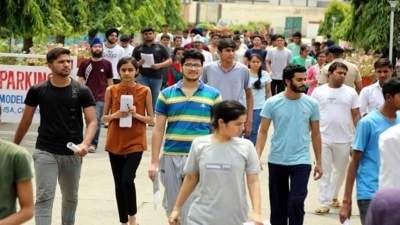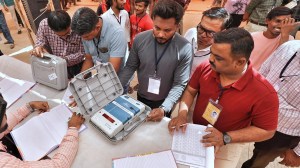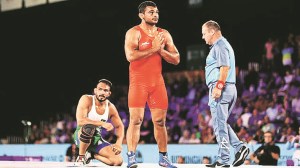- India
- International
In Delhi today: Over 5,000 survivors of sexual assault
Some spark a movement at the click of a keypad. Others trudge 10,000 km across the country for their stories to be heard, stories that were largely left out of India’s #MeToo movement.
 The Garima Yatra started from Mumbai on Dec 20. (Express photo: Shalini Nair)
The Garima Yatra started from Mumbai on Dec 20. (Express photo: Shalini Nair)
The bus rumbles along to its final destination for the day. After traversing much of Madhya Pradesh over the last few days, it has just entered the eastern tip of Gujarat. As the vehicle halts for the night at a tribal settlement in the foothills of Devgadh Baria taluka in Dahod district, its passengers troop out to the unlit open ground. Most of them are survivors of sexual violence, and in case of minor survivors, their parents, all from rural Dalit and Adivasi communities.
Around the soft glow of the hearth-flame, the local women host them for their last meal of the day: makai ki roti, dal, and onions. Tonight’s stay is in a room in a dharamshala where three dozen thin mattresses are rolled out on every inch of the floor.
It has been a long day for the 34-year-old. She had spent the day, like many before this one, recounting her story of having been violated by multiple men and the stigma that followed. Despite having barely recovered from typhoid, she left her village in Madhya Pradesh to join this cross-country journey that started off from Mumbai on December 20, 2018. Shouting slogans while marching through the day, by night her sore throat can barely let out a squeak. But after everything that she has been through, she says, she is glad to have found her voice now: “Pehle kuch bola hi nahi jaata tha. Par galat hum nahi hai, galat woh log hai, galat woh samaj hai. Soch ko mitane ke liye yaatra nikali hai (Initially I could never speak about it. But we are not in the wrong, the perpetrators are wrong, society is wrong. We are on this journey to change mindsets.”)
Some spark a movement at the click of a keypad. Others trudge 10,000 km across the country for their stories to be heard. Of being gang raped. Of being trafficked and auctioned off. Of generations of minor girls being forced into caste-based prostitution. Of being violated by upper-caste men and then violently threatened into silence. Of being branded witches and paraded naked. And after having survived everything, of being shamed for their ordeal.
Hundreds of survivors of sexual violence have come together to be part of a 65-day Garima Yatra (dignity march) to break the silence and end the stigma. Almost all of them are from Scheduled Caste and Scheduled Tribe communities from villages and small towns whose stories could not be heard in India’s #MeToo movement. The march, partly on foot and partly in vehicles, has been organised by the Rashtriya Garima Abhiyan, a coalition of civil society organisations working against caste-based discrimination and gender violence.

At every stop enroute, they are joined by hundreds of locals some of whom, inspired by the stories, speak of their own trials. The journey will culminate in Delhi on February 22, 2019, after having covered 200 districts in 24 states. Around 5,000 survivors and families, who were all part of the journey at one point or the other, are expected to converge in Ramlila Maidan on the final day.
***
Early next morning, sipping tea to soothe her throat, the 34-year-old from Madhya Pradesh says the journey is about shifting the shame from the survivor to the perpetrator. A shame she has relived many times since four years ago, when she was abducted from her husband’s tribal village in MP by two men who raped her for several days. She was later sold off to a Thakur man who violated her for the next six months. When she finally managed to escape and go to the police station, they first refused to lodge a complaint and days later, when they finally did, subjected her to the banned two-finger test.
“The delay in medical examination didn’t help my case. When the magistrate said there is no proof, I told him that I could strip naked to show him the many scars they had inflicted all over me,” she recalls adding that her return home was no solace as her husband and in-laws accused her of eloping and battered her until she bled. Not welcome in her parental home either, she recounts, “With nowhere to go, for eight days, I took shelter at the railway station. A social worker found me there and helped me find a place to live.”
She is today fighting multiple cases, all on her own — against her perpetrators and against her husband for custody of her 10-year-old son and 13-year-old daughter. She recalls that the first time she spoke of her experience during the yatra, she broke down as did the many women in the audience. But every passing day, talking of her grief and listening to that of many like her, has bolstered her spirits and her resolve.
Kranti, a volunteer with the Rashtriya Garima Abhiyan, states that the support of community groups and women’s self-help groups at the ground level has ensured massive turnout in every village and town, and also taken care of the meals and overnight stay. “Those on this journey have all had a hard time with police and the courts. It has been even harder for them to take this step and speak up despite pressure from their own families and the community,” said Kranti.
Data from the National Crime Record Bureau (NCRB) shows that of all the cases registered under the SC/ST Prevention of Atrocities Act in conjunction with sections of the Indian Penal Code, the majority pertain to crimes against Dalit and Adivasi women. The maximum cases are reported under the crime head of ‘Assault on (SC/ST) Women to Outrage Her Modesty’ and ‘Rape’.
According to the last NCRB data (2016), a quarter of the rape cases of SC/ST women were pending investigation by the police at the end of the year – though the law mandates that the investigating officer must submit his report within 30 days to the Superintendent of Police. Of the 8,259 cases pertaining to rape of Dalit women for trial before the court during the year, the pendency by year-end was a high 87 per cent and conviction a mere 3.7 per cent. Similarly, for Adivasi women, of the total 3,563 cases that came up for trial, the pendency stood at 86.8 per cent and conviction a mere 2.8 per cent of the cases that came up for trial.
These numbers do not account for the many who are dissuaded from filing FIR for fear of social ostracism and threat to personal safety.
***
Among the many who are part of this journey is Bhanwari Devi from Rajasthan, whose struggles led to the landmark Vishaka judgement for prevention of sexual harassment at workplace. Even 25 years after her gang rape, her upper-caste perpetrators are at large and this march, she believes, would amount to a lot. “The battle that I took up in my small way has today taken the form of a big movement with a name (#MeToo). But the voices of women from villages, who like me never got justice, have not been part of this so far. When we take to the streets in such larger numbers, the government will have to take notice,” said Bhanwari Devi.
There have been some ripples already. Abhiyan convenor Ashif Shaikh points out that after meeting survivors, the new chief ministers of MP and Chattisgarh, Kamal Nath and Bhupesh Baghel, have already promised to roll out some of their demands such as setting up a special police task force to combat sexual violence, fast-track courts, and banning the two-finger test.
The journey, meant to reassert the dignity of survivors, has also highlighted the many manifestations of caste and sexual violence. For instance, a day before reaching Gujarat, in Ratlam, MP, the local survivors who came to attend the Garima Yatra were mostly from the denotified Bachchada tribe, where minor girls have been traditionally often forced to solicit along the highways.
One of them, who had a child a few years ago while she was still a minor, for the first time shared the stage with the Superintendent of Police as an equal, as she spoke of how the community needs reservation in education and jobs so as to put an end to their traditional life of forced prostitution.
In MP’s Jhabua district that borders Gujarat, several rape survivors from the Bhil community working as agricultural labourers came forward to speak of the frequent sexual assaults by men from powerful castes. In Gujarat’s Dahod district, the local women who joined the march were mainly those who were subject to daayan pratha (branding widows as witches to deny them property rights) and haraji (public auction of daughters to the highest bidder).
The dual oppression of caste and gender is evident from the National Family Health Survey 2015-16 data, which shows that the percentage of women (age 15-49) who have experienced physical violence since age 15 is 35.7% for SC women and 31% for ST women as against 22% for other women.
Every day of the journey involves addressing the local audiences and taking them along in the marches within their villages or towns under the rallying cry: “Garima yatra karein pukar. Balatkariyon par hai dhikaar.” But before that, each morning begins with the travellers seated in a circle sharing their stories and drawing courage from each other. At one such meet at the Sabarmati Ashram in Ahmedabad, the parents of a 10-year-old rape survivor from Uttar Pradesh speak up.
The father, a construction worker, says, “This man used to stalk her and had assaulted her four times before the incident happened. But our many police complaints were never taken seriously.” The mother, who is determined that her daughter finish her education even if that means that she has to carry chilli powder and scissors in her school-bag daily, adds, “We never got any respect from the police or the court when we approached them. Our own people rejected us instead of rejecting the man who committed the crime against my daughter. This march has helped us regain our lost respect and hope.”
Another mother of a minor rape survivor, who has resolved to finish the journey despite a limp caused by polio, talks of how she didn’t like it when a top police officer who shared a stage with some survivors blamed the society for all the ills, not once accepting how law enforcement continues to fail survivors. “Woh kehete hai bacchi ko maa sanskaar dena chahiye. Baap kyun nahi? Aur ladki ko hi kyun, ladke ko kyun nahi kuch sanskar dena hain (He said the mother has to teach her daughter values. Why not the father? And why just the daughter? Why not the boys?)” she asks.
The 34-year-old from MP tells the group how a school principal, who hosted them for a public meeting, was wrong to object to them using the word ‘balaatkar (rape)’ instead of being pained by what they had been through. A 25-year-old from Betul chips in, “They all seem to think that it is rape happens to girls who don’t dress modestly. I was wearing a sari but that didn’t protect me from rape.” She is one of many tribal women from her village who were trafficked and sold (in her case, for a sum of Rs 25,000) for forced marriages to upper caste men in whose community women are fewer owing to female foeticide.
After the journey ends, both the women plan to shift to Dewas in MP and work towards realising their individual dreams. The 34-year-old wants to start stitching and also design clothes so that she can some day open a boutique. The younger woman plans to join a beauty parlour course. Neither has ever set foot inside a school, so also on their list is learning to read and write.
At the end of every day, as the bus winds its way to a shelter for the night, no matter how long or tiring the day has been, the bus reverberates with songs and thumping of dholaks. And the last song is mostly about sisterhood: “Chalo sakhi aaj hum sanghatan banayenge.”
Apr 18: Latest News
- 01
- 02
- 03
- 04
- 05






































